NewIntroducing Memo AI — Turn voice notes into structured insights→
Top Logseq Alternatives: Boost your note-taking game
Compare the top Logseq alternatives to find the perfect note-taking app that matches your style. Discover new features and workflows!
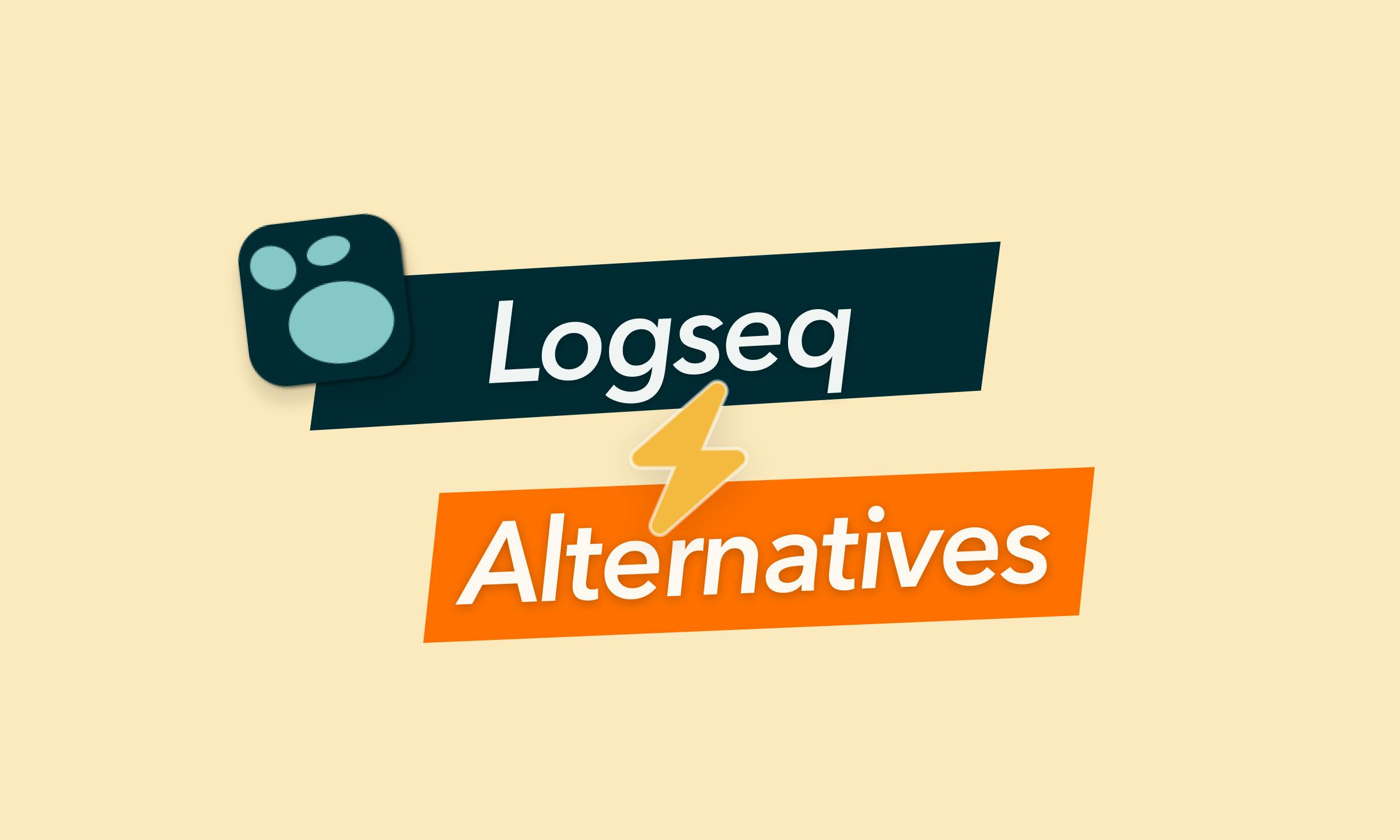
Whoever said less choice equals less confusion clearly didn't consider the countless note-taking apps available today. Logseq, a privacy-first, open-source knowledge management tool, has significantly gained attention. But, it's not the only game in town. If Logseq doesn't quite match your digital note-taking needs, or if you're eager to explore other options, you're in the ideal spot. In this article, we'll investigate the best alternatives to Logseq, put them head-to-head, and examine their features, so you can decide what fits your needs effortlessly!
- Are you seeking a no-frills app that's all about plain text notes?
- Or maybe an all-inclusive suite that brings notes, tasks, calendar, all in one place?
- Perhaps you're searching for an app that supports handwriting or doodles on your touchscreen?
So, let's explore these fantastic apps that could change your productivity game for the better.
Logseq alternatives at a glance
| App | Key Features | Pricing |
|---|---|---|
NotePlan | Calendar & task management integration, markdown, plain text storage, seamless search | Free plan, Paid plans start at $9.99/mo |
Markdown-based, local storage, plugins & themes, networked note graph | Free plan, Paid plans start at $50/user/year | |
Roam Research | Seamless backlinking, networked thought, queries | Paid only, Starts at $15/mo |
Outline-based, tasks & calendar integration, real-time collaboration | Free plan, Paid plans start at $5.84/mo | |
Quick capture, powerful actions, templates | Free plan, Paid plans start at $1.99/mo | |
Visual, whiteboard-like, kanban boards | Open Source, Paid plans start at $7.99/mo | |
All-in-one workspace, databases, rich templates | Free plan, Paid plans start at $10/mo | |
Spaced repetition, networked thought, PDF tools | Free plan, Paid plans start at $10/mo | |
Open-source, Markdown-based, cross-platform | Open Source, Paid plans start at $2.99/mo | |
Simple outlining, infinite nesting, tags | Free plan, Paid plans start at $4.99/mo | |
Visual board-like interface, simultaneous notes | Paid plans start at $6.99/mo |
Why Consider Alternatives to Logseq?
While Logseq is a solid choice for those who appreciate its open-source nature and advanced task management capabilities, it might not always be the perfect fit for everyone. The key to finding a tool that works best for you lies in understanding your specific needs and requirements.
Perhaps you're a visual learner who needs visually-appealing tools for note-taking and brainstorming, like mind maps or kanban boards. Maybe you're looking for certain integrations with other apps you regularly use for your productivity workflow, which Logseq might not provide. Or, you might just fancy a change and want to explore what else is out there in the realm of knowledge management and productivity software tools.
One thing that bugged me about Logseq was how hard it might be to get my information out of it. Sure, it lets you export, but the block system makes it tricky to move everything to a different app. If that kind of easy data transfer is important to you, it might be smarter to look at something else.
Also, even if you're a satisfied Logseq user, checking out alternatives can expose you to new features and workflows that you might not have known you needed or wanted. In essence, you never know what you're missing until you explore what else is out there!
Let's take a look at some of the most reputable Logseq alternatives available, comparing not only pricing but also user ratings and reviews. Keep in mind, each of these tools have their own strengths and weaknesses, but they may offer just the feature or experience you are looking for.
NotePlan
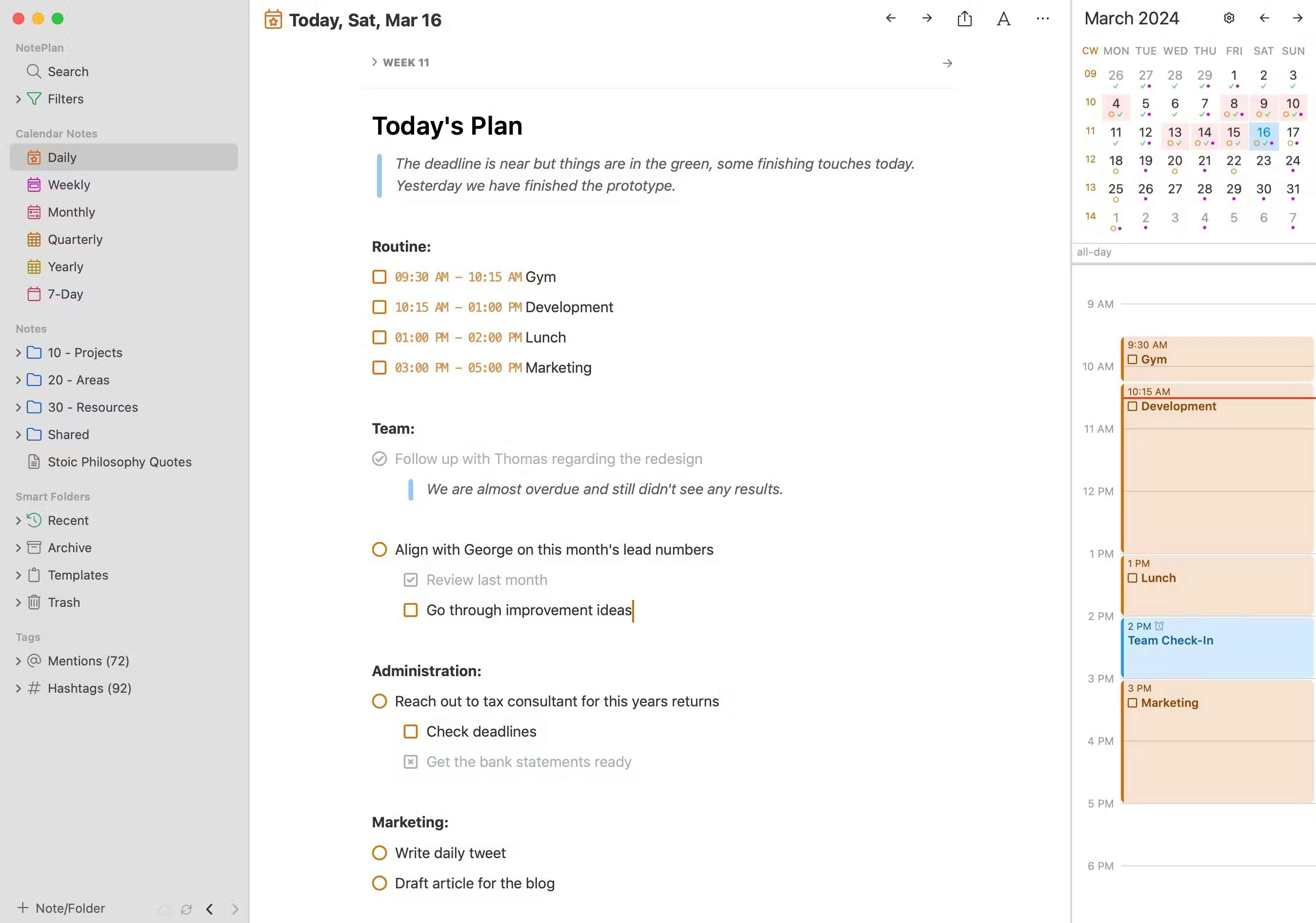
If you've struggled to keep your schedule, tasks, and notes organized, NotePlan could be a great solution. Unlike Logseq's focus mostly on connecting ideas, NotePlan brings everything together into one cohesive workspace. Imagine being able to jot down tasks directly within your daily notes, attach deadlines, and visually see them alongside your existing appointments!
The ability to use markdown formatting within your task-filled notes ensures everything feels familiar for those already comfortable with this approach. Plus, with seamless syncing to your existing calendar, there's no need to enter events twice. You get a full picture of your scheduled day, allowing for notes directly related to upcoming tasks or meetings without having to juggle between apps.
If you feel overwhelmed by multiple apps for keeping track of what you need to do and find your notes disconnected from your schedule, NotePlan could help get you back on track. It emphasizes the practical execution of tasks and gives you a singular place to manage the daily chaos.
Pros
- The Power of the Calendar: NotePlan's deep integration with your calendar transforms your notes. I no longer just have scattered knowledge; I have context. Each day has a dedicated notes page, letting me see tasks, events, and ideas side-by-side. It's a game-changer for how I plan my time and execute projects.
- Markdown Done Right: I love Logseq's use of Markdown, and NotePlan takes it further. Not only are my notes beautifully formatted, but NotePlan offers smart commands and shortcuts. I can schedule tasks, set reminders, and link between notes with more ease than ever before.
- A Focus on My Workflow: Logseq's flexibility is a double-edged sword. I spent time tweaking the setup instead of focusing on my work. NotePlan provides a clear, opinionated structure, freeing my mind to focus on what matters most – my notes, ideas, and getting things done.
- Future-Proof Notes: NotePlan stores your notes in plain text Markdown files. This means you're not locked into a proprietary system. Your notes are yours, and you can easily export them or use them with other tools if needed. This future-proofs your knowledge and ensures you're never held hostage by a specific platform.
- Speed as a Feature: NotePlan is blazing fast. My ideas flow from my mind to the screen effortlessly. No more waiting on indexes to build or complex interfaces to load. This frictionless environment promotes creativity and keeps me in the zone.
- Task Management Powerhouse: NotePlan goes beyond simple note-taking. It's a task management powerhouse. Daily and weekly planning features keep my priorities front and center. I can create checklists, set deadlines, and track progress with ease. What used to take scattered tools and to-do lists now happens seamlessly within my note-taking environment.
Cons:
- Users unfamiliar with Markdown might have a slight learning curve, although it's generally simple to pick up.
If you...
- Crave daily focus instead of overwhelming possibilities
- Want to see your notes connected to deadlines and a calendar
- Prefer markdown that feels effortless and natural
- Want blazing-fast search without complicated queries
... then NotePlan might be the perfect change of pace for you. It puts the power in your hands, not in the complexity of the tool.
Obsidian
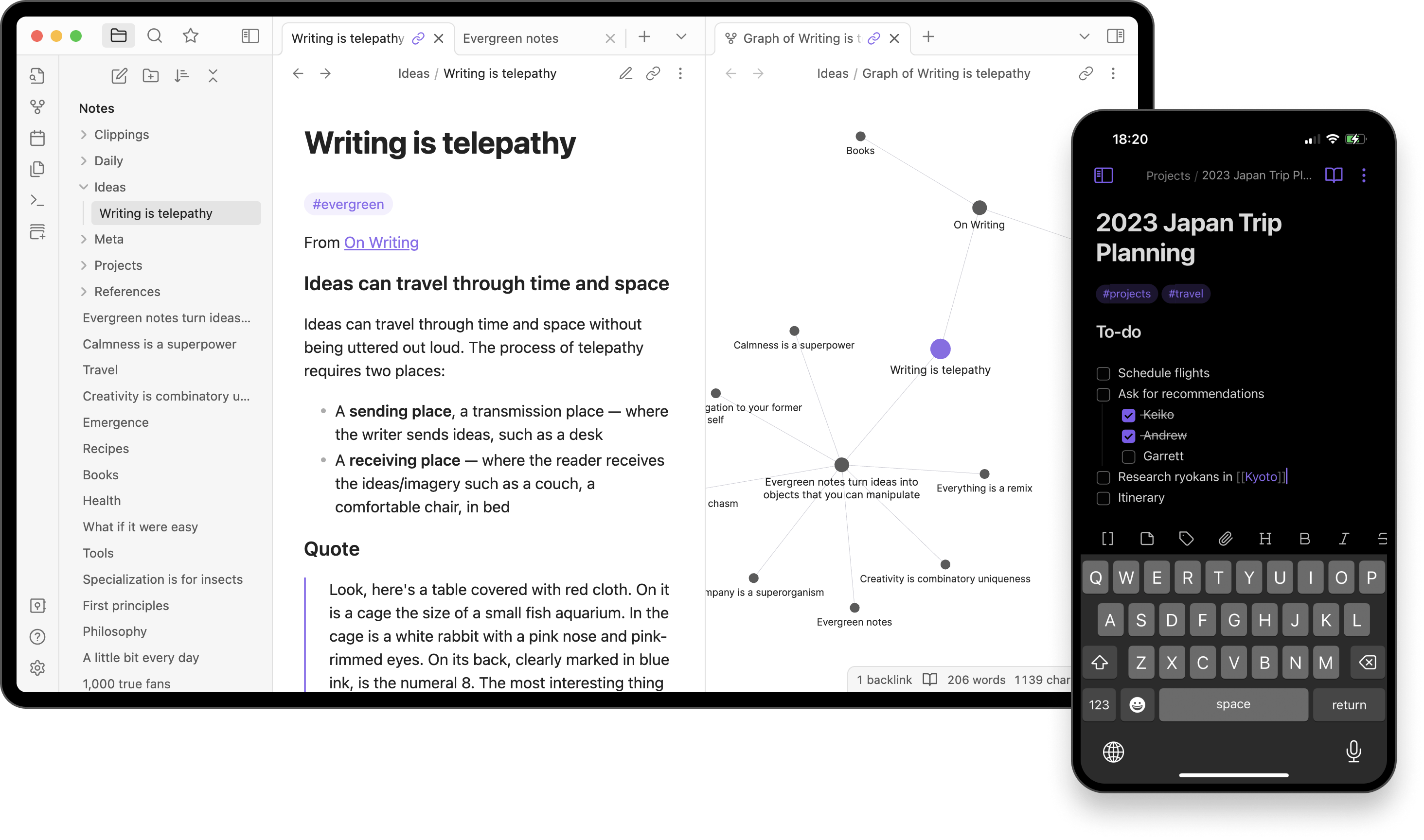
I've found Obsidian to be a compelling alternative to Logseq. While both help you get organized, Obsidian encourages you to think about how your ideas relate to each other. It does this by making it incredibly easy to link notes together – You just add those double brackets and boom! It's done. This lets you easily explore related ideas and even visualize these relationships in the graph view.
I also like that Obsidian keeps all your notes locally as simple Markdown files. This not only makes you feel more secure about data privacy, but it means you have a lot of control over how your notes are stored and backed up. On the flipside, that local approach can make things trickier if you need to work on my notes from multiple devices. And don't get me wrong, there's definitely a learning curve if you want to dive into all the advanced customization...plugins, themes, and the like.
Pros
- Customization and Flexibility: Obsidian's core strength lies in its adaptability. You have extensive control over the look, feel, and functionality due to its support for custom themes, plugins, and CSS modifications.
- Established Markdown Focus: Obsidian prioritizes a clean and distraction-free markdown writing experience. You work with standard text files, which are future-proof and highly portable.
- Large and Active Community: Obsidian enjoys a massive user base and a vibrant community. This translates to plentiful resources, tutorials, and a broad selection of plugins to extend features.
- Ownership and Privacy: Your data resides entirely within your control on your own devices. Obsidian prioritizes privacy.
- Offline Functionality: Work on your notes anywhere, even without an internet connection.
Cons
- Steeper Learning Curve: Obsidian's flexibility can be overwhelming for beginners. It might take some effort to get it working the way you want.
- Outliner Functionality Less Refined: While Obsidian supports the basics of outlining and block referencing, Logseq's core design makes outliner-style note-taking more intuitive.
- Performance with Large Vaults: Obsidian can sometimes feel sluggish if you have a vast collection of notes (though this is actively being improved).
- Mobile Experience Less Polished: While functional, Obsidian's mobile app generally lags a bit behind the desktop experience in terms of smoothness.
- Plugin Reliance: Some features desirable for a Logseq-like workflow might require finding and setting up the right community plugins.
Is Obsidian the Right Logseq Alternative for You?
The best choice boils down to your individual needs and workflow preferences:
Choose Obsidian if:
- You value maximum flexibility and customizability.
- You prefer a pure Markdown writing experience.
- You want complete ownership of your data.
- You don't mind a little tinkering.
Logseq might be a better fit if:
- You want a seamless outliner experience out of the box.
- You favor a more structured and interconnected note-taking style.
- You want strong PDF annotation features built-in.
Pricing:
Free plan. Paid plan starting with $50/user/year for commercial use
Ratings & Reviews:
- G2 Crowd: Not Available
- Capterra: 4.9 out of 5
Roam Research
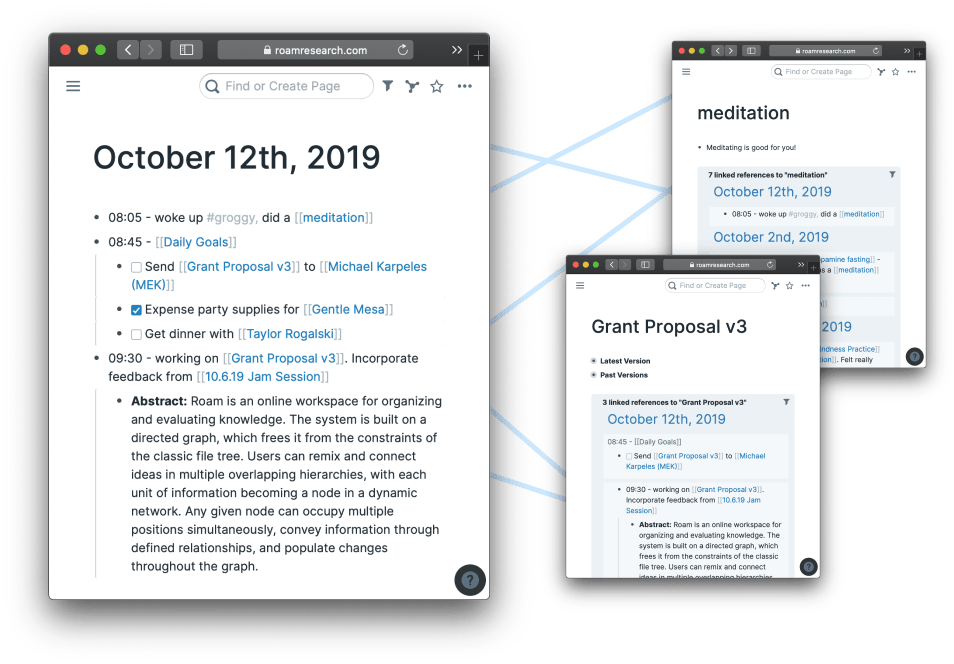
I looked into Roam Research as an alternative to Logseq, and it definitely intrigues me. Their emphasis on small "blocks" of information and how they link to one another creates a really flexible note structure. It allows you to see relationships between ideas that you wouldn't have noticed before, and I love the way the backlinks let's you trace your thought process over time.
However, there's that subscription cost – it adds up, especially since Logseq is open-source and you can self-host it. And while Roam is incredibly powerful, the interface has a significant learning curve. It's great if you are willing to really dive in, but not ideal for anyone who needs a tool they can just pick up and use immediately.
Pros
- Seamless Backlinking: Roam Research pioneered a fluid backlinking system that makes connecting ideas exceptionally easy.
- Powerful Networked Thought: Roam's design encourages you to build a web of interconnected notes, promoting the surfacing of insights.
- Graph Visualization: Visualize the relationships and patterns within your notes through Roam's unique graph view.
- Queries and Filtering: Roam has a powerful query system to slice and dice your knowledge base for specific information.
- Established Features: Roam is a mature product with a robust feature set for networked thought.
Cons
- Cost: Roam Research is a premium product with a significant price tag. This can be a barrier to entry for many.
- Proprietary Format: Your data is stored in Roam's format, making it less portable than plain-text systems like Logseq. This creates a degree of vendor lock-in.
- Steep Learning Curve: Roam's features and philosophy have a learning curve, especially for those not accustomed to networked note-taking principles.
- Performance with Large Databases: Roam can become slow when dealing with very large and interconnected databases.
- Online-Dependence: Roam Research works primarily as an online service. Pure offline use is less supported.
Should You Consider Roam Research?
Here's a guide to help you decide:
Choose Roam Research if:
- You're all-in on the philosophy of networked thinking and the power of backlinks.
- You are willing to invest in a premium tool and don't mind the proprietary data format.
- You value advanced querying and filtering capabilities.
Logseq might be a better fit if:
- Cost is a major concern.
- You prefer full control and ownership over your notes in a plain-text format.
- You prioritize a familiar outliner-based workflow.
Pricing:
Paid Only. Starting with $15/mo for personal plan.
Ratings & Reviews:
- G2 Crowd: Not Available
- Capterra: Not Available
Amplenote
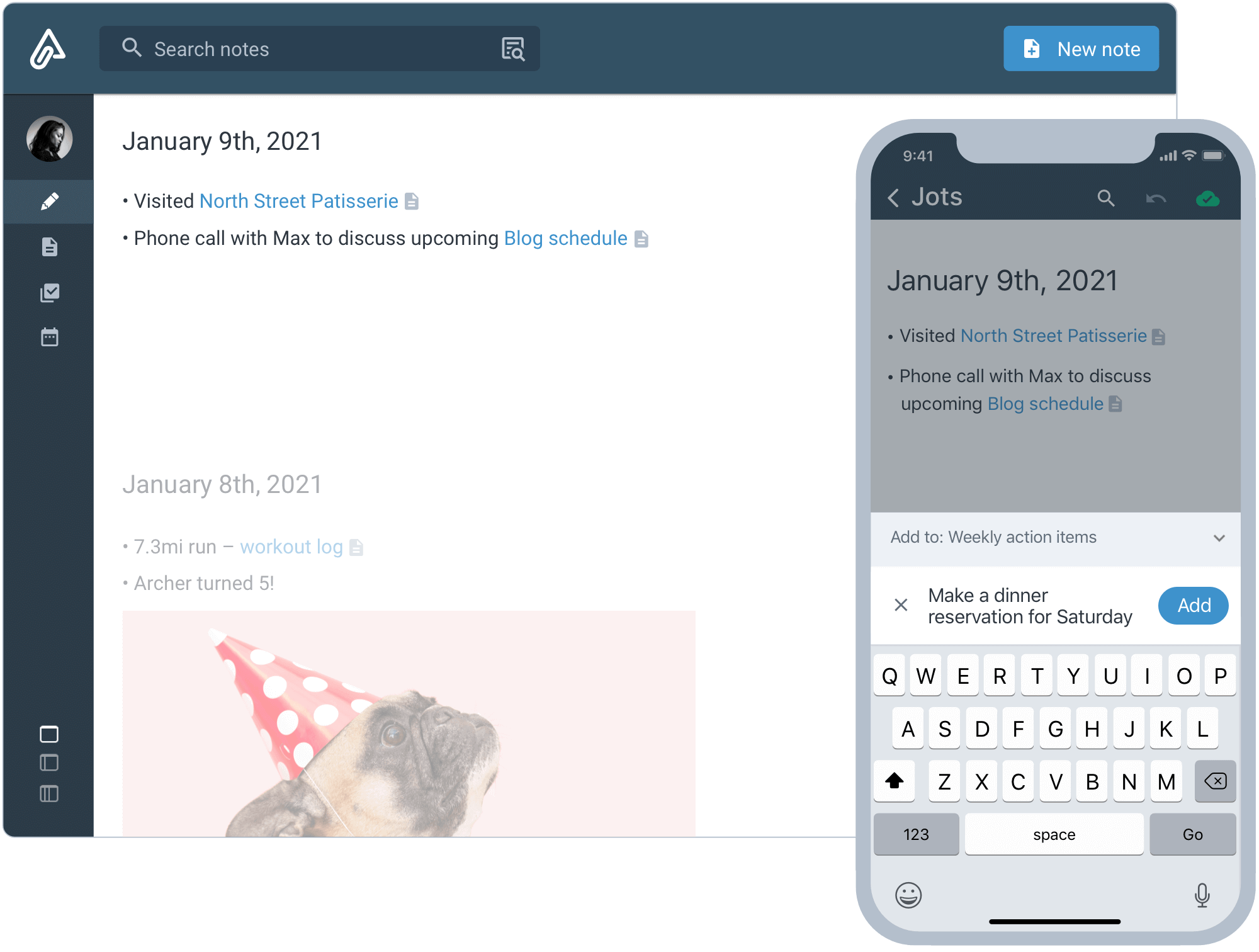
If you're looking for a more structured alternative to Logseq, Amplenote might be the perfect fit. Instead of focusing on linking ideas, it uses a traditional outline-based system complete with built-in tasks. If neatly organized lists are your jam, or you find Logseq a bit too open-ended, this change could be refreshing.
Amplenote also shines in the collaboration department. Shared notebooks and real-time editing are features that Logseq lacks. This makes Amplenote a contender for anyone who works closely with others, especially if the team needs a structured way to share both notes and tasks. The fact that it works on your phone, tablet, computers – basically everything – is also huge, since you are constantly on the go.
Pros
- Ease of Use: Amplenote offers a simple, streamlined interface focusing on fast note creation and straightforward organization.
- Task-Oriented Approach: Amplenote integrates notes with to-dos and a built-in calendar, making it a great choice for task-focused note-taking.
- Jots and Rich Notes: The separation between quick "Jots" and more detailed notes helps keep your workflow organized and efficient.
- Backlinks and Tagging: Amplenote supports backlinks and tagging for connecting your notes, though the emphasis is less on an interconnected web of ideas.
- Collaboration Features: Amplenote includes options for sharing and collaborating with others, useful for team-based projects.
Cons
- Less Emphasis on Networked Thinking: If your primary focus is building a second brain with heavy use of backlinks and graph-like thought visualization, Amplenote may not be the ideal fit
- Limited Outliner Functionality: Compared to Logseq, Amplenote's approach to outlining is less robust.
- No Graph View: There's no dedicated visual representation of how your notes connect, a significant feature in network-focused tools.
- Mobile Functionality: While Amplenote does have a mobile app, its feature set is somewhat limited compared to the web version.
- Data Export: While possible, exporting data from Amplenote can be a little less straightforward than formats like Markdown.
Is Amplenote the Right Logseq Alternative for You?
Consider Amplenote if:
- You value a simple and task-focused note-taking experience.
- You manage a lot of to-dos alongside your notes.
- Collaboration is an important part of your workflow.
- You don't require a primarily backlinks-driven thought philosophy.
Logseq might be a better fit if:
- You thrive on the interconnected, networked knowledge base approach.
- Heavy outlining features are essential to your workflow.
- Graph visualizations are important for how you understand your notes.
Pricing:
Free Plan. Paid plan starting wiht $5.84/month.
Ratings & Reviews:
- G2 Crowd: Not Available
- Capterra: Not Available
Drafts
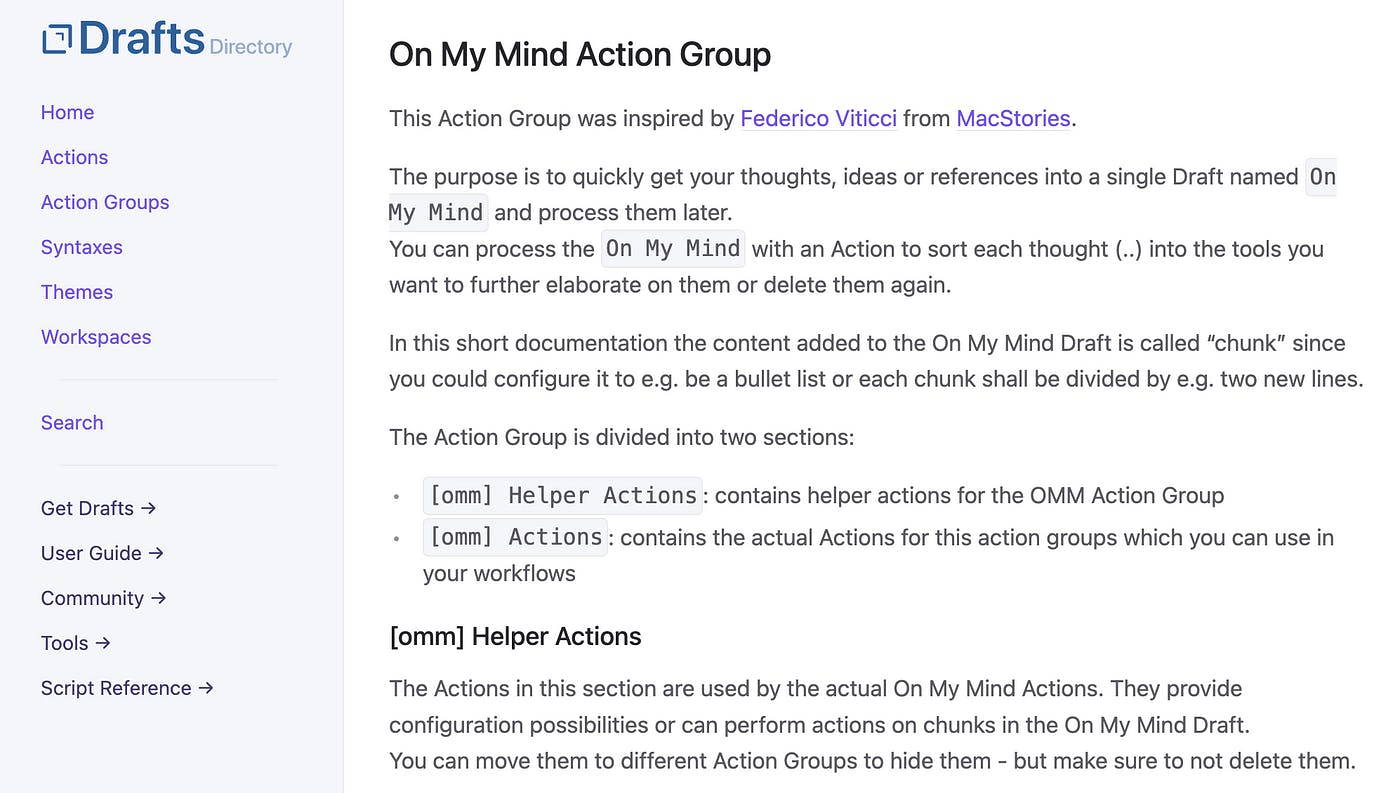
If you're looking for something different than Logseq, you might be surprised by Drafts as it takes a different approach. Where Logseq is all about linking and building a knowledge base, Drafts is about speed. The interface is super clean and simple, making it perfect for those moments when you just need to get a thought down quickly, whether it's an idea, a reminder, or a task.
One of the coolest things about Drafts is how it integrates with everything. Whatever app you are in, you can quickly pop open Drafts, write your note, send that text to email, your to-do list app...you name it. It fits nicely into your existing workflow. It even has powerful automation features if you are the kind of person who likes to tinker and make everything work just-so.
Of course, it's not a replacement for something like Logseq if you're into linking ideas or a more visual knowledge base. Drafts is mostly about text, and it won't create those connections for you. However, if you value a lightning-fast, flexible way to capture your fleeting thoughts on the go, Drafts is an interesting option, and could become a surprisingly useful tool in your arsenal.
Pros
- Rapid Capture: Drafts excels at being a quick capture inbox for ideas, text snippets, and notes. Its focus is on getting things down quickly.
- Powerful Actions: Drafts' core strength lies in its actions – customizable automations that can manipulate and send your text to numerous apps and services.
- iOS and macOS Focus: Drafts is designed superbly for the Apple ecosystem, offering tight integration with other apps and system features.
- Markdown Support: Drafts works seamlessly with Markdown, ensuring a familiar writing experience.
- Templates and Workspaces: Create pre-structured drafts and tailor the interface for different use cases, providing flexibility.
Cons
- Not Primarily for Knowledge Management: Drafts' focus is on text capture and processing, not on building a deeply interconnected knowledge base like Logseq.
- Limited Backlinking: While you can link drafts together, the backlinking system isn't as robust or central to the workflow as it is in Logseq.
- No Outliner Structure: Drafts doesn't offer the hierarchical outliner structure that's core to Logseq's note organization.
- No Graph Visualization: You won't find the knowledge graph visualizations that help illustrate note connections, a feature common to networked thought tools.
- Subscription Model: Drafts operates on a subscription model, which might be a consideration compared to Logseq's free offering.
Is Drafts the Right Logseq Alternative for You?
It's less a direct alternative and more about potential integration:
Consider Drafts alongside Logseq if:
- You need a blazing-fast way to capture notes and ideas on Apple devices.
- You frequently process text and notes into other applications or services.
- You can benefit from Drafts' actions system to automate tasks related to your notes.
Logseq will likely remain your primary tool if:
- Building a structured, interconnected knowledge base is crucial.
- You rely on outliner-style organization.
- Visualizing knowledge connections through a graph is essential.
Pricing:
Free Plan. Paid Plans starting with $1.99 USD per month.
Ratings & Reviews:
- G2 Crowd: Not Available
- Capterra: Not Available
Affine.pro
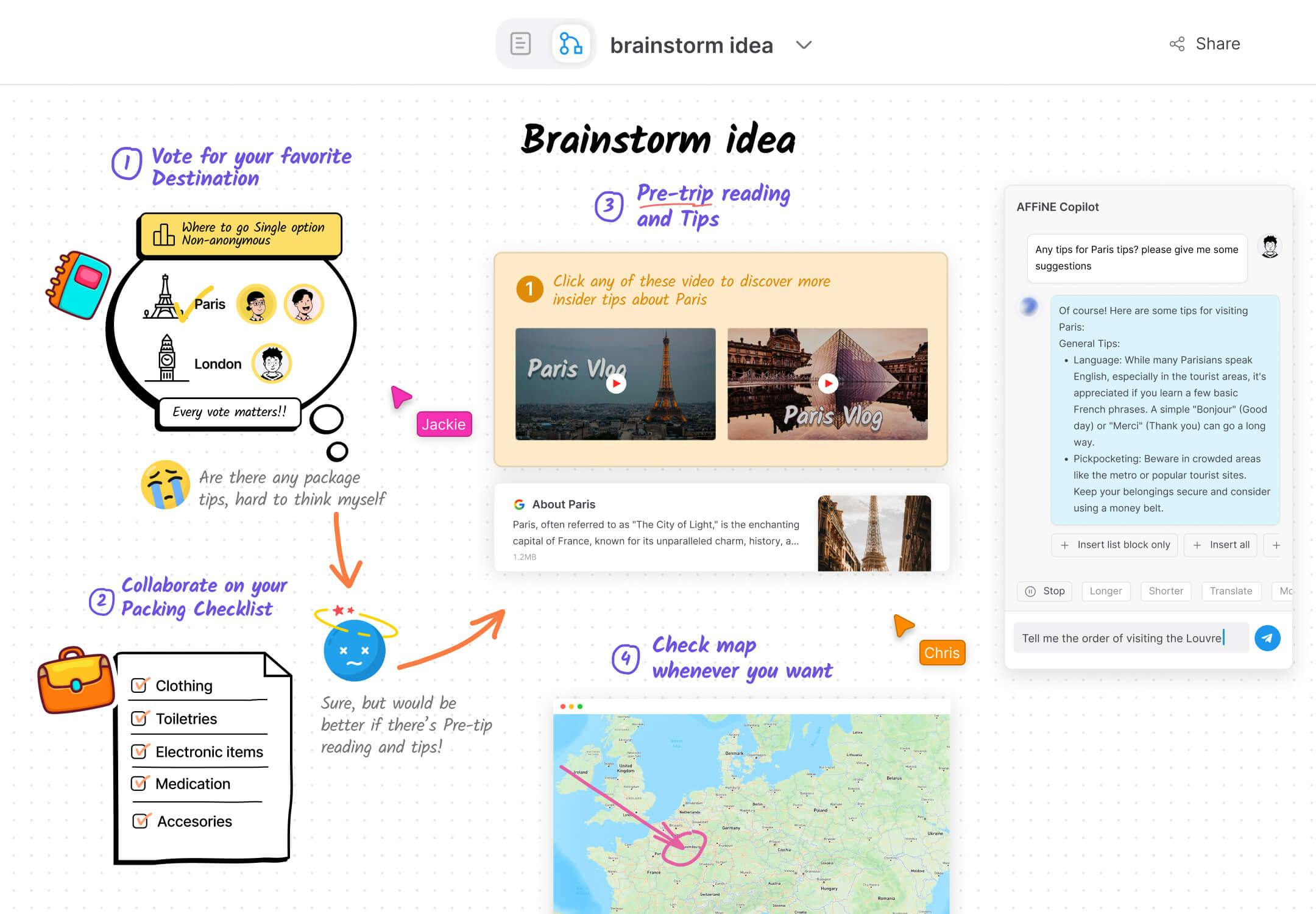
If you're looking for a structured alternative to Logseq, consider Affine.pro. It's focused heavily on project management. Instead of Logseq's linking, Affine.pro gives you timelines, kanban boards, and built-in task tracking to get things done. This appeals to the practical side in all of us – the side that loves a visual plan, clearly defined steps, and the satisfaction of checking off tasks.
If you've found that disorganization is your biggest obstacle, Affine.pro lets you turn notes into tasks with deadlines. Affine.pro lets you break down a project from your notes directly into tasks you can track and assign. And, since it's designed with collaboration in mind, I could see this being a fantastic tool for team projects when everyone needs to stay on the same page.
However, that structure can be limiting, especially when compared to the freedom Logseq gives for connecting ideas. If some of your best insights come when you're exploring and making those links, Affine.pro won't feel as powerful. It also won't visualize those connections in the same way.
Pros
- Visual and Whiteboard-like: Affine offers a spatial canvas for your notes, allowing you to arrange ideas more freely like a whiteboard.
- Focus on Connections: Affine's design encourages you to visually link ideas and concepts, promoting a focus on relationships.
- Import Variety: It can import data from various sources like Roam, Workflowy, text files, and more, making it easier to migrate existing notes.
- Collaboration: Affine includes collaboration features, making it useful for team-based knowledge sharing.
- Visual Mapping: The spatial layout and connections can help visualize and understand complex information.
Cons
- Different Workflow Philosophy: Affine's approach differs significantly from Logseq's outliner-based, block-level structure. This may require a significant adaptation in your note-taking process.
- Less Mature: Affine is a relatively new tool. It may still be missing some features or have areas under active development compared to more established options.
- No Outlining: If you rely heavily on hierarchical outlining for note organization, Affine might not be the best fit.
- Limited Backlinking: While you can link concepts, the backlinking system isn't as robust or central to the workflow as it is in Logseq.
- Data Portability: Affine likely uses its own data format, potentially creating a form of vendor lock-in compared to Logseq's plain text files.
Is Affine the Right Logseq Alternative for You?
Consider Affine if:
- You are a highly visual thinker and prefer whiteboard-like note organization.
- You focus on mapping connections between ideas rather than strictly hierarchical notes.
- You are willing to try a newer tool with a unique workflow philosophy.
Logseq might be a better fit if:
- You rely heavily on outlining and block-level note organization.
- Robust backlinking is central to the way you connect ideas.
- Data ownership and portability in plain-text format are essential.
Pricing:
Open Source. Free Plan available. Paid Plans starting with $7.99 per month.
Ratings & Reviews:
- G2 Crowd: Not Available
- Capterra: Not Available
Notion
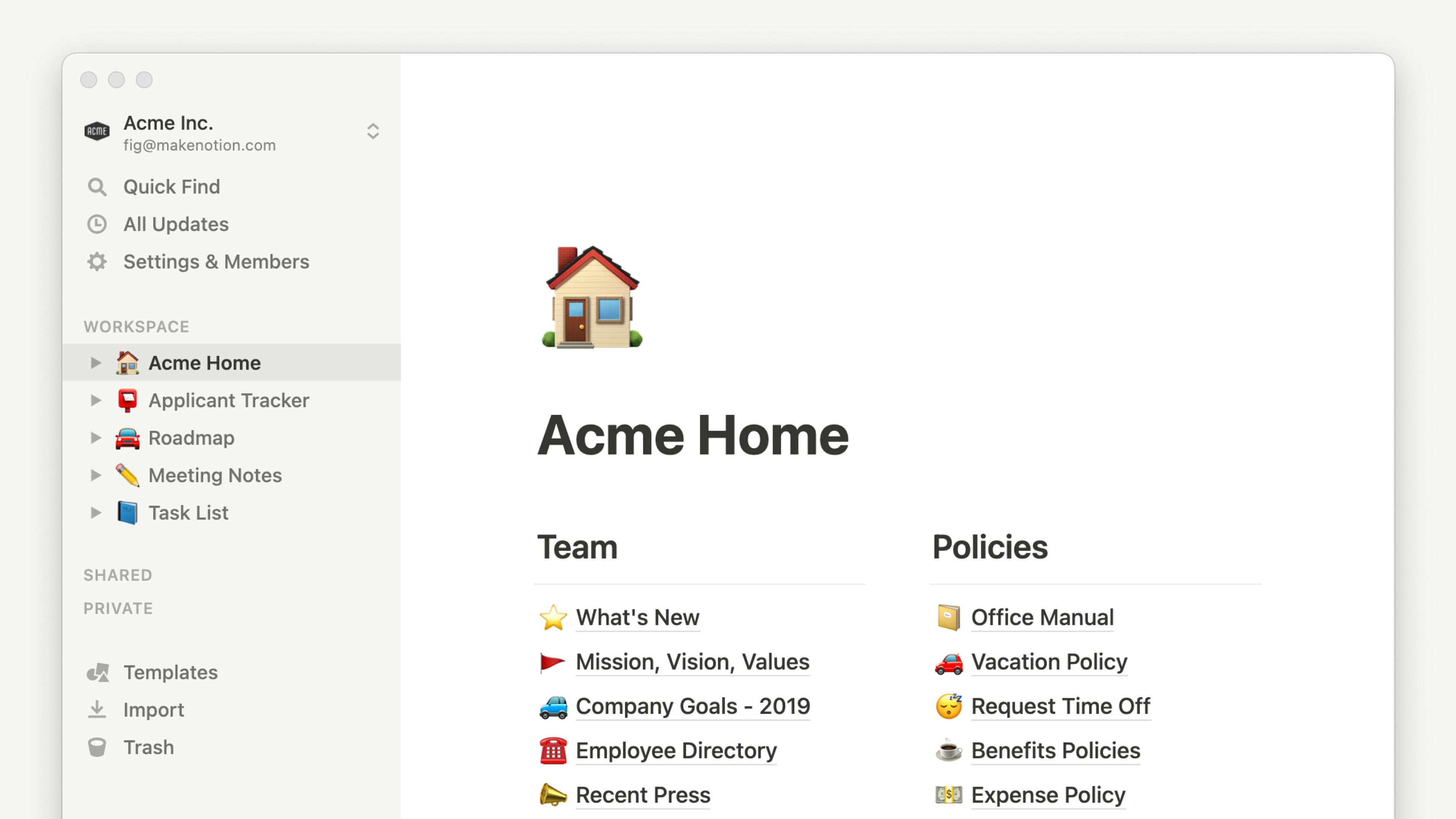
If you're looking for a flexible alternative to Logseq, Notion could be a great choice. While Logseq focuses on linking ideas, Notion gives you a blank canvas for notes, task lists, databases, and more. This adaptability lets you customize everything – perfect if you need a versatile tool that can grow with your needs.
It's also great for keeping everything connected. Your notes, tasks, and calendar can all live within the same workspace. And for team projects? Notion's collaboration tools are fantastic. You can easily share workspaces, assign tasks, and have threaded discussions right alongside your content.
However, all that power comes with a bit of a learning curve compared to Logseq's more streamlined approach. And if your primary goal is to link ideas fluidly and see those connections, Logseq might remain a better tool.
Pros
- All-in-one Workspace: Notion offers a vast array of tools beyond note-taking, including databases, project management features, wikis, and more. This makes it ideal for centralizing diverse types of work.
- Visual Appeal: Notion provides a polished user interface with great attention to aesthetics and the ability to customize the look of your notes.
- Templates: Notion boasts a massive library of templates for various use cases, giving you a headstart in creating different types of content and workflows.
- Powerful Database Features: Notion's databases are flexible and offer multiple views (tables, boards, calendars), making it excellent for structured information.
- Large Community: Notion's popularity means there are extensive resources, tutorials, and a community for support.
Cons
- Different Focus: Notion's strength lies in its versatility, not specifically in the networked thought principles that Logseq emphasizes.
- Steeper Learning Curve: The breadth of features can make Notion more complex to master, especially for those seeking a focused note-taking tool.
- Block-Based, Not Outliner-Focused: While Notion has blocks, it doesn't offer the seamless hierarchy and outlining experience that's core to Logseq.
- Limited Backlinking: Notion supports basic linking between pages, but backlinking isn't as fluid or central to the workflow as in Logseq
- Vendor Lock-in: Your data is stored in Notion's format. While export is possible, it's less portable than plain-text file formats.
Is Notion the Right Logseq Alternative for You?
Consider Notion if:
- You need a multi-purpose workspace that extends beyond simple note-taking.
- You manage projects, tasks, or need robust database features alongside your notes.
- You value visual presentation and extensive templates.
- You don't mind a slight learning curve in exchange for flexibility.
Logseq might be a better fit if:
- Networked thought and knowledge graph concepts are central to your workflow.
- You prioritize a streamlined outliner-based note-taking experience.
- Easy data portability and ownership in plain text are important to you.
Pricing:
Free plan. Paid plan starting with $10/mo for personal plan
Ratings & Reviews:
- G2 Crowd: 4.7 out of 5
- Capterra: 4.7 out of 5
Remnote
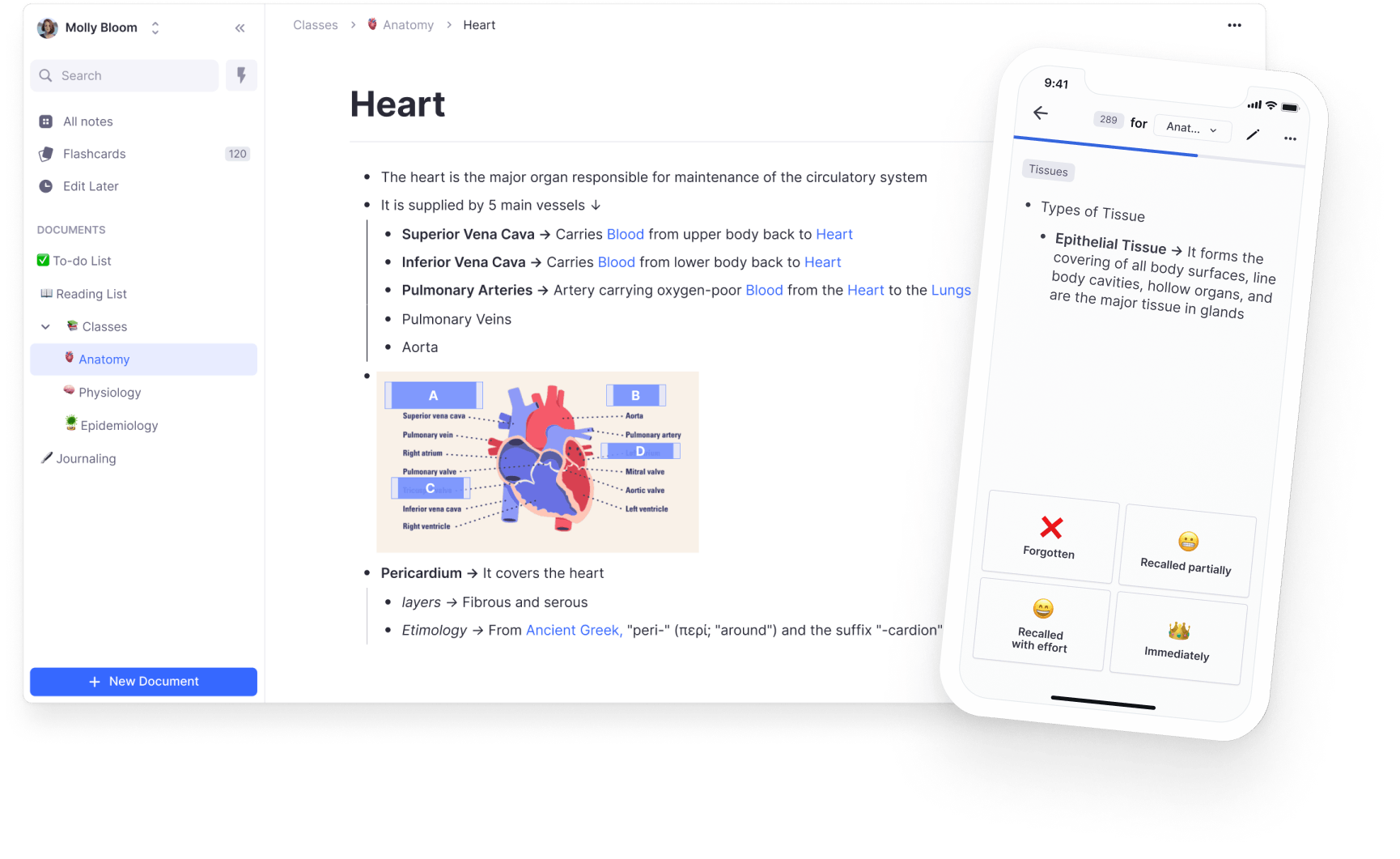
If you're looking for an alternative to Logseq that goes beyond just storing information and helps you master it, Remnote might be the answer. The spaced repetition feature is its true standout – instead of just reviewing flashcards, you can embed quizzes directly within your notes for seamless learning. If you find information slips away over time or need to memorize complex concepts, this could be a major advantage.
Remnote also does a great job of visualizing connections between your ideas. The knowledge graph creates a dynamic map of your notes, making it much easier to understand how concepts relate. For visual learners or anyone tackling a complex subject, this feature offers valuable insights. Of course, the collaboration features are a bonus, ideal if you need to work together with classmates or colleagues on a shared knowledge base.
Keep in mind, though, that Logseq's linking system still allows for a deeper level of exploration and connection between ideas compared to Remnote's more structured approach. Additionally, while Remnote's focus on active learning is powerful, sometimes you simply need a place to capture and organize thoughts quickly, without the built-in quizzes.
Pros
- Spaced Repetition Learning: RemNote is primarily known for its sophisticated spaced repetition features, making it a powerful tool for memorization and knowledge retention.
- Hybrid Outliner & Networked Thought: RemNote offers a blend of outlining functionality with backlinking and graph-style connections between ideas.
- Smooth PDF Annotation: RemNote includes robust PDF annotation tools, great for students or workflows that analyze documents.
- Portals: Portals allow you to embed content from other parts of your knowledge base, offering flexibility in how you connect notes.
- Active Development: RemNote is under active development with new features and quality-of-life improvements released frequently.
Cons
- Can Be Overwhelming: RemNote's various features and structural options can feel complex at first, making the learning curve a little steeper than Logseq's.
- Outliner Functionality Not as Fluid: While outlining is supported, the core "outliner feel" may not be as smooth or intuitive as Logseq's for those used to that workflow.
- Proprietary Data Format: Like Roam Research, RemNote uses its own format for storing your notes, reducing portability compared to tools offering plain-text storage.
- Limited Offline Support: RemNote relies heavily on being an online tool, although there are options for offline use, these can be limited.
- Potentially Distracting UI: Depending on your preferences, some may find RemNote's interface a little busier than the intentionally minimalist feel of Logseq.
Is RemNote the Right Logseq Alternative for You?
Consider RemNote if:
- You heavily rely on spaced repetition for learning and memorization.
- You want a mix of outliner structure and networked thought concepts.
- You need excellent PDF annotation features built into your note-taking tool.
- You're willing to invest some time into learning its features.
Logseq might be a better fit if:
- You prioritize a purely outliner-based workflow and seamless block-level organization.
- Ease of use and a streamlined interface are essential.
- Complete control of your data in plain text format is a must.
Pricing:
Free Plan. Paid plans starting with $10/mo.
Ratings & Reviews:
- G2 Crowd: Not Available
- Capterra: Not Available
Joplin
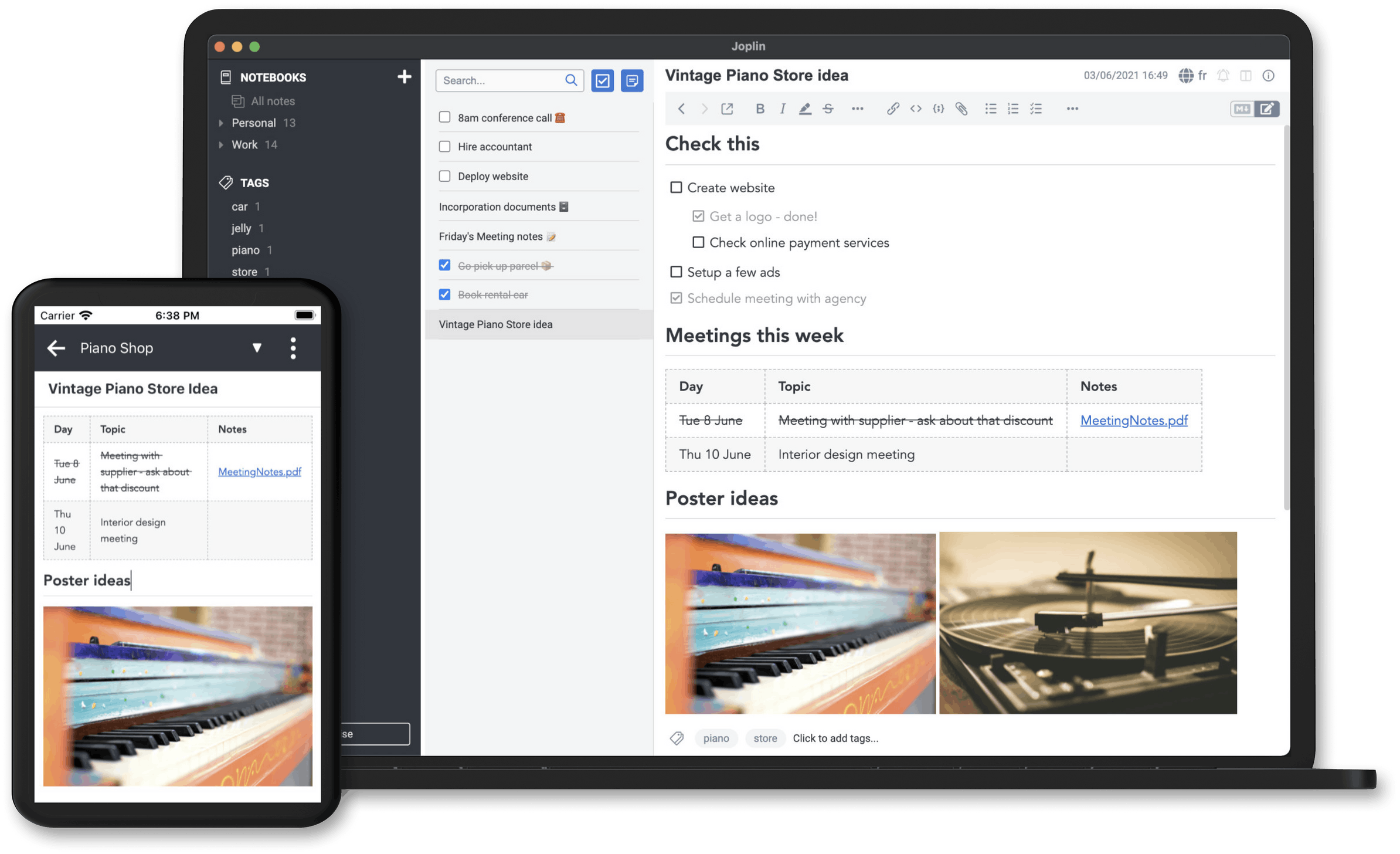
I've checked out Joplin as a possible Logseq alternative, and the simplicity is a major draw. Instead of focusing on complex linking systems and knowledge graphs, it provides a comfortable, traditional experience that feels instantly familiar. You can easily add images, files, and even format your text to improve clarity. For anyone who values a well-organized, easy-to-use note-taking tool, Joplin's intuitive design brings a sense of ease that can be hard to find.
Joplin's real strength lies in the control it gives you over your notes. Its open-source nature means there are no secrets, and you have the flexibility to choose how your notes are stored and synced. Want cloud storage for easy access? Joplin works seamlessly. Prefer complete local control or even have your own server for maximum privacy? All of these options are at your disposal. Add in the end-to-end encryption, and you have a note-taking app designed for those who demand complete ownership of their data.
Of course, you won't find the same level of idea linking or visualization tools that Logseq offers. That freedom to explore unexpected connections between your thoughts is harder to achieve in Joplin's more structured format. If deep knowledge exploration is your primary use case, Logseq might remain a better fit.
Pros
- Open-Source and Free: Joplin is a free, open-source note-taking app, emphasizing privacy and long-term data ownership.
- Markdown-Based: Joplin uses Markdown, making your notes future-proof, portable, and readable by numerous other applications.
- Cross-Platform: Joplin is available on Windows, macOS, Linux, Android, and iOS, allowing you to work on your notes across devices.
- Offline Functionality: Joplin works fully offline, and you can choose to sync your notes across devices using preferred cloud storage services.
- Customization: Joplin offers options for themes and some customization through plugins, though not to the same extent as Obsidian.
Cons
- No Outliner Focus: Joplin is primarily a notebook-style note-taking app. It lacks the native outlining experience Logseq provides.
- Limited Backlinking: While Joplin allows linking between notes, it lacks Logseq's seamless backlinks system and visual representation of connections.
- No Graph View: You won't find a graph visualization of note connections as you would with tools designed for networked thinking.
- Steeper Learning Curve with Some Features: Setting up things like syncing and encryption in Joplin may require some technical knowledge.
- Less Focus on Networked Thought: Joplin is an excellent note-taking app, but it's not designed with the same focus on interconnected notes as Logseq.
Is Joplin the Right Logseq Alternative for You?
Consider Joplin if:
- You value complete data ownership, privacy, and a Markdown-based note system.
- You want a cross-platform note-taking solution that works well offline.
- You don't need a heavy focus on outlining and backlinking features.
Logseq might be a better fit if:
- You require a seamless outliner experience as the core of your workflow.
- Fluid backlinking and a graph visualization of note connections are essential.
- You thrive on the networked knowledge base approach.
Pricing:
Open Source. Starting with $2.99/mo basic plan
Ratings & Reviews:
- G2 Crowd: 5 out of 5
- Capterra: Not Available
Workflowy
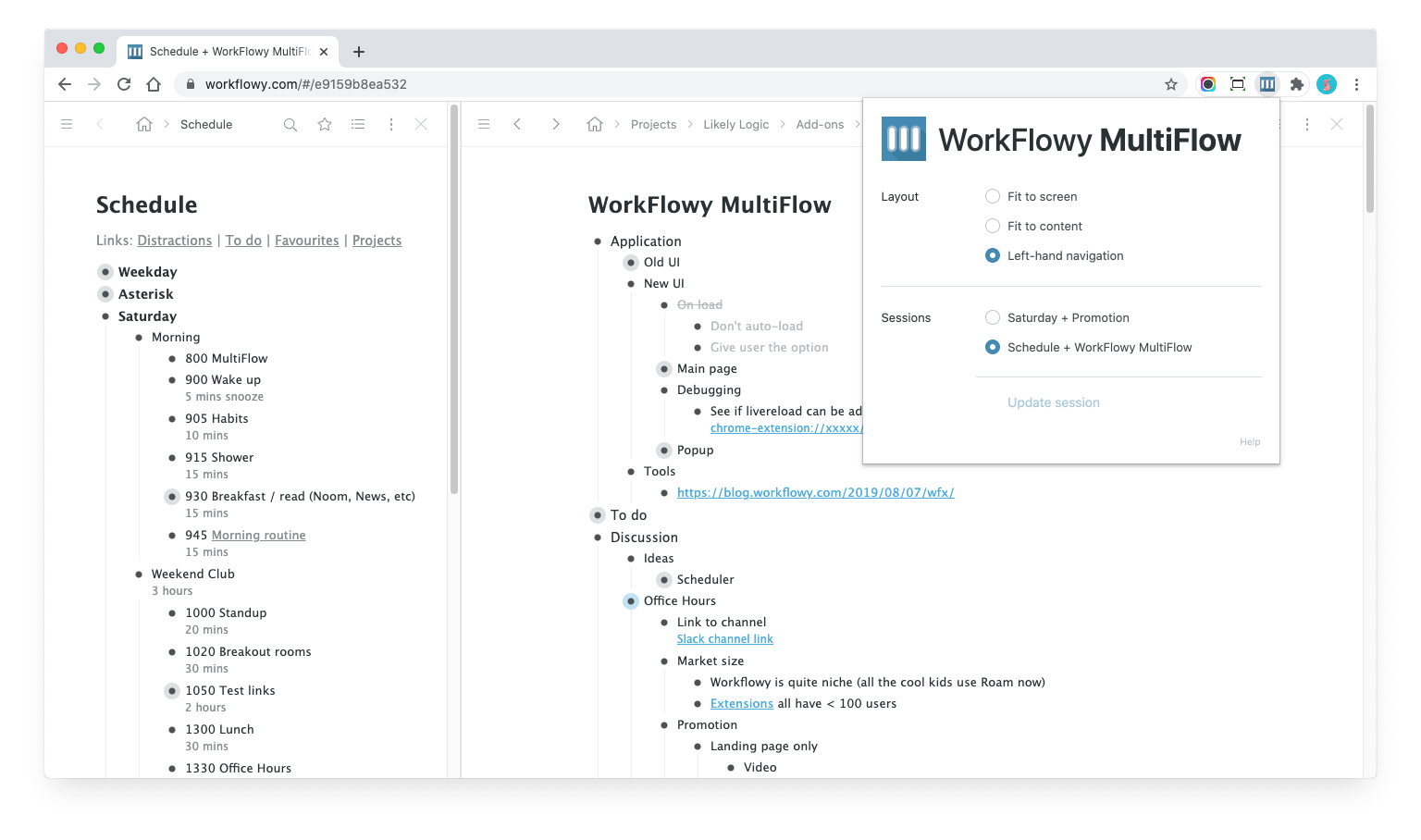
If you find yourself overwhelmed by complex note-taking apps and crave a more structured way to organize your thoughts, Workflowy might be the perfect change of pace. It replaces all the fancy linking and formatting of Logseq with a deceptively simple list-based system. But those lists can be incredibly powerful. You can break down projects into subtasks, create detailed outlines, or capture every fleeting thought without worrying about it fitting into a bigger structure.
This streamlined approach translates to an incredibly fluid experience when rearranging priorities or restructuring a plan. Simple drag-and-drop actions let you reprioritize in seconds, a lifesaver if your projects change direction quickly. Plus, for anyone working collaboratively, the real-time updates ensure that everyone involved in a project is always seeing the latest version.
However, if you rely on seeing how your ideas connect or thrive on Logseq's ability to help you think more laterally, Workflowy's focus on lists might feel restrictive. There's no built-in way to visualize those connections. Additionally, Workflowy's interface is deliberately minimal. If you like to include images, diagrams, or a variety of formatting within your notes, you'll likely miss those features.
Pros
- Simplicity and Focus: Workflowy offers an incredibly clean and distraction-free outlining experience.
- Infinite Nesting: You can nest bullet points infinitely, creating deep and complex hierarchies for detailed organization.
- Zooming and Focus: Workflowy allows you to zoom into specific branches of your outline, providing a focused view on a particular area of notes.
- Speed: Workflowy is fast and lightweight, making it great for rapid note-taking and idea organization.
- Tagging: Offers flexible tagging for adding cross-contextual connections to your notes.
Cons
- No Backlinking: Workflowy does not have seamless backlinking functionality like Logseq. You can manually link between items, but it's not as central to the core experience.
- Limited Markdown Support: Workflowy has basic Markdown support, but it's not as extensive as a Markdown-focused tool like Logseq.
- No Graph View: There's no visual representation of the relationships between your notes as you'd find in a networked thought tool.
- Limited Features: Workflowy intentionally remains focused on outlining. You won't find the extensive features of many other note-taking tools.
- Pricing Structure: Workflowy has a free tier, but some advanced features and unlimited list items require a paid subscription.
Is Workflowy the Right Logseq Alternative for You?
Consider Workflowy if:
- Pure hierarchical outlining is at the core of your workflow.
- Simplicity and a distraction-free writing environment are top priorities.
- You value speed and ease of creating highly structured notes.
Logseq might be a better fit if:
- Fluid backlinking and connecting ideas across contexts are crucial.
- You want a knowledge graph visualization of your notes.
- You prefer full Markdown support and more extensive formatting options.
Pricing:
Free Plan. Paid plan starting with $4.99/month.
Ratings & Reviews:
- G2 Crowd: 4.5 out of 5
- Capterra: 4.7 out of 5
Scrintal
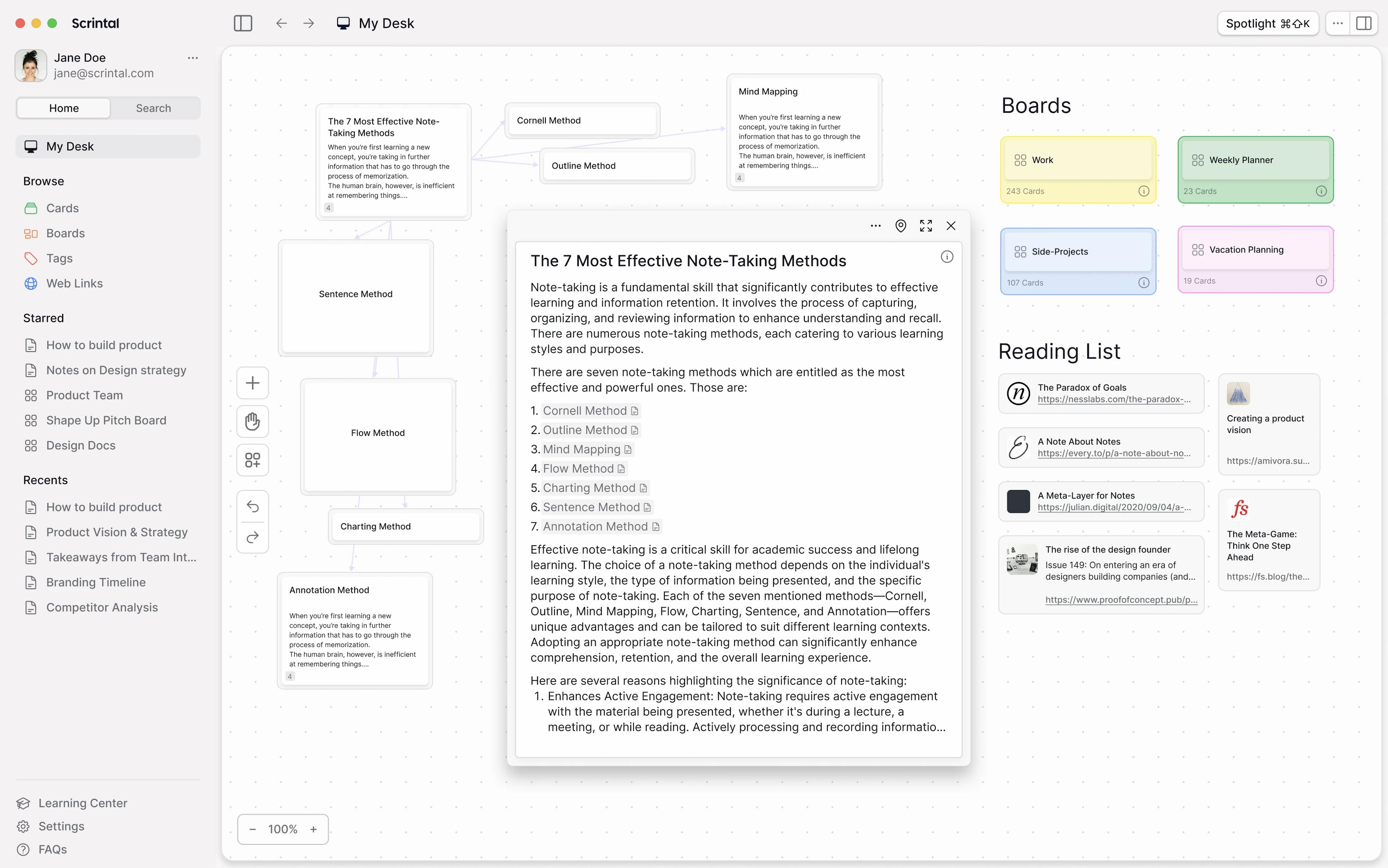
If you're looking for a Logseq alternative that prioritizes speed and focus, Scrintal might be a perfect fit. Instead of Logseq's linking and markdown features, you'll find a streamlined workspace designed to let you capture ideas, organize them quickly, and seamlessly incorporate your research.
Scrintal understands how easily distractions can derail your workflow. Its clean interface eliminates a lot of the "noise" of complex note-taking apps. And, being able to drop web articles, PDFs even images alongside your notes eliminates so much friction when you're collecting and connecting information during research.
Its collaboration features are a major plus, too. Shared notebooks and simple tagging ensure that those working with you can quickly find what they need. If you frequently work on research-heavy projects as part of a team, Scrintal could be a powerful tool for everyone involved.
Of course, you'll lack Logseq's more sophisticated ways to visually connect ideas and see the "big picture" of your knowledge base. Scrintal is more about executing on specific tasks and organizing related information. For deeper exploration and creative thinking, Logseq might remain a better choice.
Pros
- Visual Organization: Scrintal's core strength lies in its visual board-like interface. Notes and ideas become cards that you can arrange freely.
- Multiple Views Alongside Each Other: Scrintal lets you work with multiple notes, PDFs, or images simultaneously, great for comparison and cross-referencing.
- Direct Connections: Visually create links between ideas by drawing connections between cards, which promotes non-linear thinking.
- Intuitive Workflow: Scrintal's interface feels natural for those who enjoy brainstorming or visual mapping of ideas.
- Planning and Execution: Its design is suitable for moving from initial idea generation to planning and outlining tasks.
Cons
- Less Emphasis on Outlining: While Scrintal supports nested blocks, its primary focus isn't on a hierarchical outliner-style structure like Logseq.
- Backlinking Less Central: Scrintal's connections are visually driven. Automatic backlinks aren't as prominent of a feature as they are in Logseq.
- Young Tool: Scrintal is relatively new and still under development. Some features may be less polished than more established options.
- No Graph View: You won't find a graph visualization of note connections as found in some networked thought tools.
- Data Format: Scrintal has its own proprietary format, potentially creating a form of vendor lock-in compared to Logseq's plaintext storage.
Is Scrintal the Right Logseq Alternative for You?
Consider Scrintal if:
- Visual organization and working with multiple notes simultaneously are top priorities.
- You resonate more with a spatial, whiteboard-like thinking process.
- You find yourself moving quickly from ideas to outlining and planning related tasks.
Logseq might be a better fit if:
- A streamlined outliner experience is essential to your workflow.
- Fluid backlinking and automatic note connections are crucial.
- Data portability in a plain-text format is a must-have.
Pricing:
Paid Plan starting 6.99/mo billed annually
Ratings & Reviews:
- G2 Crowd: Not Available
- Capterra: 4.8 out of 5
Can one app really replace your entire productivity stack?
NotePlan did. Try NotePlan free for 7 days to learn how